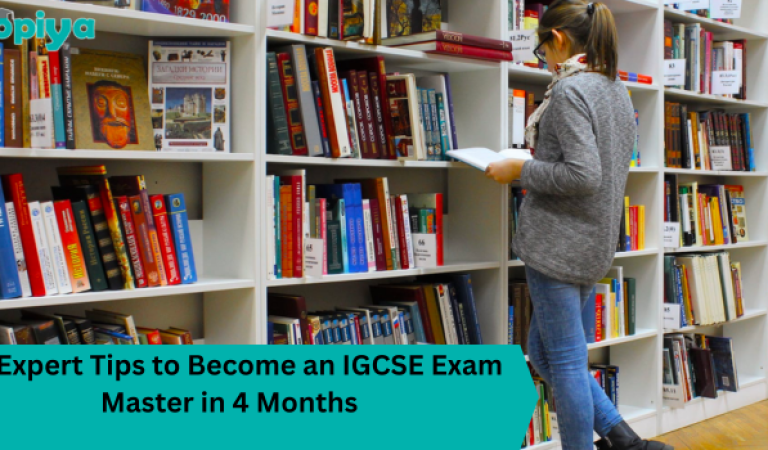- Unlock 10 powerful tips & resources to ace your igcse exam in just 4 months. Achieve top grades & unlock your future. Don't wait, Start a free trial today!
10 Powerful Tips & Resources for IGCSE Exam Mastery in 4 Months
Preparing for the IGCSE exams in just four months may seem daunting, but with the right approach, it’s achievable. These exams, administered by the University of Cambridge, are widely recognized and can significantly impact your educational and career opportunities. Effective preparation not only ensures a strong grasp of the subject matter but also builds confidence and reduces exam-related stress.
With dedication and strategic planning, you can maximize your potential in the next four months. Let’s dive into ten essential tips that will help you become an IGCSE exam master!
Can You Master IGCSE Exams in 4 Months?

Mastering the IGCSE exams in such a short period is ambitious, but it’s achievable with a focused strategy. To succeed, you’ll need a well-structured plan and consistent effort.
Crafting an Effective Study Plan
Create a study program that covers all subjects systematically. Allocate time based on each subject’s weightage and complexity.
- Use diverse study tools: Combine textbooks, online resources, and past papers to become familiar with the test format.
- Seek support: If any topic feels unclear, reach out to teachers, tutors, or study groups for help.
The key to success lies in consistent revision and practice. Use practice exams to simulate exam settings, manage time, and measure your progress.
Must Read: IGCSE Singapore: Find the best Resources for IGCSE Exams
Importance of understanding the exam format for strategic preparation
The IGCSE test format differs between subjects, with each having its own distinct structure and components. To strategically prepare for the tests, it is critical to have a full understanding of the exam structure, including a breakdown of the various courses and their components.
Understanding the framework of the IGCSE exams allows you to adjust your study strategy more successfully. Each subject has its own set of components and criteria, including coursework, practical tests, and written exams. Familiarizing yourself with these facts will allow you to efficiently organize your time and resources, focusing on areas that demand more attention and practice.
Must Read: IGCSE Exam Dates for Zone 3 and Zone 5 (April-June 2024)
10 Tips to Become an IGCSE Exam Masters

1. Understand the Exam Structure
Know each subject’s components, including coursework, practicals, and written exams. This helps focus your preparation where it’s needed most.
2. Develop a Study Plan
Create a balanced schedule that covers every subject. Avoid last-minute cramming by spreading out your preparation.
3. Use Past Papers for Practice
Familiarize yourself with question patterns, difficulty levels, and recurring topics by working with past papers.
4. Clarify Doubts Quickly
Don’t let uncertainties pile up—ask teachers or tutors for explanations.
5. Manage Your Time Wisely
Plan for revision, practice, and relaxation. Good time management prevents burnout and ensures balanced preparation.
6. Focus on Weak Areas
Identify topics where you need improvement, and dedicate extra time to master them.
7. Simulate Exam Conditions
Take timed mock exams to practice under pressure and build confidence.
8. Leverage Study Resources
Use study guides, websites, and apps designed specifically for IGCSE preparation.
9. Maintain a Healthy Lifestyle
Sleep well, eat healthily, and exercise regularly to stay mentally sharp.
10. Stay Positive and Motivated
Celebrate small wins to maintain motivation. A positive mindset will improve your focus and productivity.
By incorporating these detailed tips into your preparation, you can strategically approach the IGCSE exams, understand their format, and optimize your chances for success.
The Role of Exam Format in Strategic Preparation
Understanding the exam format for each IGCSE subject is crucial for effective preparation. Each subject has unique components, such as coursework, written tests, and practical assessments. Familiarizing yourself with these structures allows for a more strategic study approach. Here’s a breakdown of the main subjects:
Mathematics: The IGCSE Mathematics exam covers topics such as algebra, geometry, and statistics. It primarily consists of written papers that test your theoretical knowledge and problem-solving skills.
English Language: This subject assesses your reading, writing, and comprehension abilities. You will encounter various components, including comprehension passages and essay writing.
Science Subjects: Subjects like Biology, Chemistry, and Physics include both written exams and practical components. These evaluations focus on experimentation and data analysis, testing your scientific inquiry skills.
History: The IGCSE History exam emphasizes understanding key events and eras. It evaluates your ability to analyze historical sources and contexts critically.
Foreign Languages: For foreign languages like French, Spanish, and German, the tests typically include speaking, listening, reading, and writing sections. This comprehensive assessment measures your overall language competency.
Business Studies: The Business Studies exam covers topics like finance, operations, marketing, and human resources. It evaluates your understanding of business concepts and their practical applications.
By familiarizing yourself with these different formats, you can allocate your study time effectively. This strategic approach helps you avoid surprises on exam day and enhances your chances of success.
Conclusion
Conclusion
In conclusion, preparing for the IGCSE exams within four months requires a well-planned strategy, consistent practice, and the use of appropriate resources. Start by understanding the exam format, create a structured study plan, and use past papers to track your progress.
Balanced preparation includes managing your time effectively, prioritizing weak areas, and maintaining a healthy lifestyle. With a positive mindset and focus, you can confidently take on the exams and set the foundation for future success.
Good luck on your journey to becoming an IGCSE exam master!
Pankaj Dhiman
With over 6 years of experience in SEO, this expert specializes in achieving outstanding ranking results through a blend of on-page, off-page, and technical SEO techniques. Bringing deep knowledge of SEO strategies, algorithms, and trends, they excel at boosting organic visibility and driving high-quality traffic. Additionally skilled in content writing, they create engaging, SEO-optimized content that enhances site performance and aligns seamlessly with search engine optimization efforts for holistic success.






